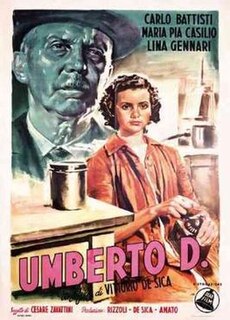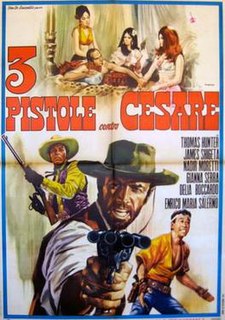
The cinema of Italy comprises the films made within Italy or by Italian directors. Since its beginning, Italian cinema has influenced film movements worldwide. Italy is one of the birthplaces of art cinema and the stylistic aspect of film has been the most important factor in the history of Italian film. As of 2018, Italian films have won 14 Academy Awards for Best Foreign Language Film as well as 12 Palmes d'Or, one Academy Award for Best Picture and many Golden Lions and Golden Bears.

Enrico De Nicola, was an Italian jurist, journalist, politician, and provisional head of state of republican Italy from 1946 to 1948. Afterwards, he became the first president of Italy on 1 January 1948.

Futurism was an artistic and social movement that originated in Italy, and to a lesser extent in other countries, in the early 20th century. It emphasized dynamism, speed, technology, youth, violence, and objects such as the car, the airplane, and the industrial city. Its key figures included the Italians Filippo Tommaso Marinetti, Umberto Boccioni, Carlo Carrà, Fortunato Depero, Gino Severini, Giacomo Balla, and Luigi Russolo. Italian Futurism glorified modernity and according to its doctrine, aimed to liberate Italy from the weight of its past. Important Futurist works included Marinetti's 1909 Manifesto of Futurism, Boccioni's 1913 sculpture Unique Forms of Continuity in Space, Balla's 1913–1914 painting Abstract Speed + Sound, and Russolo's The Art of Noises (1913).

The Italian Communist Party was a communist political party in Italy.

The Italian Socialist Party was a socialist and later social-democratic political party in Italy, whose history stretched for longer than a century, making it one of the longest-living parties of the country.

Umberto D. is a 1952 Italian neorealist film directed by Vittorio De Sica. Most of the actors were non-professional, including Carlo Battisti who plays the title role of Umberto Domenico Ferrari, a poor elderly man in Rome who is desperately trying to keep his rented room. His landlady is evicting him and his only true friends, the housemaid and his dog Flike are of no help.

Alessandro Blasetti was an Italian film director and screenwriter who influenced Italian neorealism with the film Quattro passi fra le nuvole. Blasetti was one of the leading figures in Italian cinema during the Fascist era. He is sometimes known as the "father of Italian cinema" because of his role in reviving the struggling industry in the late 1920s.

Francesco Rosi was an Italian film director. His film The Mattei Affair won the Palme d'Or at the 1972 Cannes Film Festival. Rosi's films, especially those of the 1960s and 1970s, often appeared to have political messages. While the topics for his later films became less politically oriented and more angled toward literature, he continued to direct until 1997, his last film being the adaptation of Primo Levi's book, The Truce.

Leone Ginzburg was an Italian editor, writer, journalist and teacher, as well as an important anti-fascist political activist and a hero of the resistance movement. He was the husband of the renowned author Natalia Ginzburg and the father of the historian Carlo Ginzburg.

The Italian Constituent Assembly was a parliamentary chamber which existed in Italy from 25 June 1946 until 31 January 1948. It was tasked with writing a constitution for the Italian Republic, which had replaced the Kingdom of Italy after the Italian civil war.

Italy competed at the 1936 Summer Olympics in Berlin, Germany. 244 competitors, 228 men and 16 women, took part in 99 events in 17 sports.

Fiorenzo Bava Beccaris was an Italian general, especially remembered for his brutal repression of riots in Milan in 1898, known as the Bava Beccaris massacre.

The Manifesto of the Anti-Fascist Intellectuals, written by Benedetto Croce in response to the Manifesto of the Fascist Intellectuals by Giovanni Gentile, sanctioned the irreconcilable split between the philosopher and the Fascist government of Benito Mussolini, to which he had previously given a vote of confidence on 31 October 1922. The idea of an anti-Fascist manifesto came to Giovanni Amendola, who wrote to Croce, a proclaimed anti-Fascist, for his opinions on 20 April 1925:
Dear Croce, have you read the Fascist manifesto to foreign intellectuals? ... today, I have met several people who feel that, following the publication of the Fascists' document, we have the right to speak and the duty to respond. What is your opinion? Would you be willing to sign such a document, or even write it yourself?
Invisible Chains is a 1942 Italian drama film directed by Mario Mattoli and starring Alida Valli, Carlo Ninchi and Giuditta Rissone. It was shot at the Cinecittà Studios in Rome. The film's sets were designed by the art directors Ottavio Scotti and Mario Rappini.

A Girl Called Jules is a 1970 Italian drama film directed by Tonino Valerii.
The Gates of Heaven is a 1945 Italian drama film directed by Vittorio De Sica.

The Assassination of Matteotti is a 1973 Italian historical drama film directed by Florestano Vancini. The film tells the events that led to the tragic end of Giacomo Matteotti and to the establishment of the dictatorship of Benito Mussolini in Italy. It was awarded with the Special Jury Prize at the 8th Moscow International Film Festival.

Antonio Gramsci: i giorni del carcere is a 1977 Italian drama film directed by Lino Del Fra. It was awarded with the Golden Leopard at the Locarno International Film Festival.

Death Walks in Laredo, is a 1967 Italian Spaghetti Western film directed by Enzo Peri and shot in Algeria. It is also influenced by the Sword-and-sandal film genre.

















